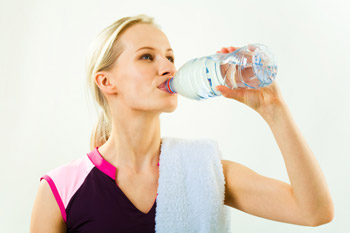 Water retention or water weight is an issue among many people, and can be a major problem for those who want to lose weight. Fluid retention can be caused by high salt intake, protein deficiency, physical inactivity, hormonal changes, heart failure, kidney disease, and use of certain medications. Evidence of water weight can be seen in the fingers, face, legs, and even toes. It can make you feel bloated, sluggish, and uncomfortable. For most people, water weight is not a serious health issue, but it can negatively impact your appearance and quality of life. A few simple changes to your diet and lifestyle could help you lose water weight fast and safely:
Water retention or water weight is an issue among many people, and can be a major problem for those who want to lose weight. Fluid retention can be caused by high salt intake, protein deficiency, physical inactivity, hormonal changes, heart failure, kidney disease, and use of certain medications. Evidence of water weight can be seen in the fingers, face, legs, and even toes. It can make you feel bloated, sluggish, and uncomfortable. For most people, water weight is not a serious health issue, but it can negatively impact your appearance and quality of life. A few simple changes to your diet and lifestyle could help you lose water weight fast and safely:
- Regular exercise: Regular workouts are the best solution to address fluid retention in the short-term. Even a short session can help decrease bloating and improve water weight loss. Exercising regularly can help maintain the natural balance of the body by controlling the body fluid levels. Including cardio or aerobic exercises in your routine can elevate your heart rate and cause your body to sweat more.
- Focus on a healthy diet: Water follows sodium and raises the amount of water in the There are certain foods that act as natural diuretics and reduce water retention or help your body fight water bloat. Try to include more potassium-rich foods in diet as it can help balance sodium levels, increase urine production, and help flush out excess water. Potassium-rich foods include acorn squash, apricots, artichokes, avocado, bananas, cantaloupe, carrots, dates, dried beans, kiwi, lentils, mango, oranges, peas, papaya, tomatoes, yogurt, and green leafy vegetables. Increasing fiber intake can reduce excess water weight by relieving bloating from constipation.
- Say “No” to processed food: Restrict consumption of processed foods and frozen foods as they are high in preservatives and additives. These foods not only cause your body to retain water and weigh more but also put your health at risk.
- Get more sleep: According to an article in Healthline, research indicates that getting sufficient sleep is just as important as diet and exercise. Inadequate sleep can cause your kidneys to retain more fluid. Aim to get a good night’s sleep.
- Reduce stress: Too much stress can elevate your cortisol levels, which directly influences fluid retention and water weight. So take steps to reduce your stress levels.
- Maintain electrolyte balance: Electrolytes are basically minerals or salts. They play an important role in your body and also regulate water balance. Too low or too high levels of electrolytes in the body can affect fluid balance and increase water weight. Consuming electrolytes supplements can be beneficial if you drink a lot of water. This is also important if you exercise regularly or live in a humid or hot environment to replace electrolytes lost through sweat. On the other hand, consuming supplements or salty foods in large amounts coupled with a low water intake can lead to high levels of electrolytes and increase water weight.
- Control sodium intake: High salt intake may increase water retention, especially if you don’t drink sufficient water and do not exercise. Fluid retention can occur if sodium levels are too high or too low, leading to bloating and swelling. So take care to avoid too high or low amounts of salt intake.
- Stay hydrated: Drink adequate amounts of water, as dehydration and over-hydration can lead to water retention. Drinking enough water helps restore the fluid balances in the body and can help you lose water weight fast. Caffeinated beverages like coffee and tea could actually help alleviate water retention as they act as a diuretic.